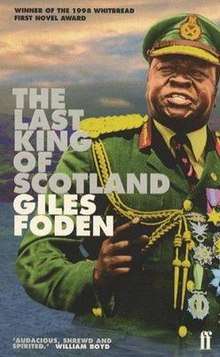The Last King of Scotland
The Last King of Scotland is a novel by journalist Giles Foden, published by Faber and Faber in 1998. Focusing on the rise of Ugandan President Idi Amin and his reign as dictator from 1971 to 1979, the novel, which interweaves fiction and historical fact, is written as the memoir of a fictional Scottish doctor in Amin's employ. Foden's novel received critical acclaim and numerous awards when it was published. In 2006, an eponymous film adaptation was released.
 | |
| Author | Giles Foden |
|---|---|
| Country | United Kingdom |
| Language | English |
| Genre | Novel |
| Publisher | Faber and Faber |
Publication date | 1998 |
| Media type | Print (hardback and paperback) |
| ISBN | 0-571-19564-4 |
| OCLC | 40981851 |
Plot introduction
The protagonist is a fictional character named Nicholas Garrigan, a young Scottish doctor who goes to work in Uganda out of a sense of idealism and adventure. He relates how he came to be the personal physician and confidant of Amin, the president of Uganda from his coup d'état in 1971 until his deposal in 1979. The novel focuses on Garrigan's relationship and fascination with the president, who soon grows into a brutal and ruthless dictator. Garrigan acts repeatedly against his better judgment, remaining in Amin's employment until he is far past the point of easy escape physically or morally. He is gradually drawn into the corruption and paranoia of Amin's rule, including the expulsion of the Asians, with disastrous results for those around him.
Development and inspiration
Drawing on his 20 years of living in Africa and his background as a journalist, Foden researched the events surrounding Amin's rise to power and downfall. He interviewed many of those who watched and participated in the Ugandan ruler's eight-year reign and evokes the form of a memoir by inserting fictional newspaper articles and journal entries, along with actual events.
In a 1998 interview with the online magazine Boldtype, Foden said he based parts of Garrigan's character on an associate of Amin's named Bob Astles.[1][2] As a British soldier who worked his way into Amin's favour, Astles was much more "proactive" than Garrigan, according to Foden, and he paid the price by spending six and a half years in a Ugandan jail after the fall of his protector.
Astles compromised himself by his direct association with Amin's security forces. While Amin was in power, Astles was alternately either favoured or punished; he was imprisoned and tortured on at least one occasion. Foden drew in part on a lengthy interview with Astles in The Times by the journalist Paul Vallely, who spoke to Astles in a Ugandan jail after smuggling a message in to Amin's henchman in a Bible.[3]
Another real-life figure who has been mentioned in connection with Garrigan is Scottish doctor Wilson Carswell.[4] Amin's personal physician was, in fact, a Ugandan doctor called Paul D'Arbela.
The title of the book refers to Amin's declaring himself the "King of Scotland".[2] Foden claims that the book is an adaptation of William Shakespeare's Macbeth as a third-world dictator.[5]
Awards and nominations
- 1998 James Tait Black Memorial Prize (for fiction) (shortlist)[6]
- 1998 Whitbread First Novel Award[7]
- 1998 Winifred Holtby Memorial Prize[8]
- 1999 Betty Trask Award
- 1999 Somerset Maugham Award
Editions in print
- 1998: New York: Knopf; Distributed by Random House, hardback, ISBN 978-0-375-40360-6 (English)
- 1998: London: Faber Paperbacks, paperback, ISBN 978-0-571-19486-5 (English)
- 1998: Faber and Faber, paperback, ISBN 0-571-19564-4 (English)
- 1999: Vintage Books USA, paperback, ISBN 0-375-70331-4 (English)
- 1999: Random House USA, hardcover, ISBN 0-375-40360-4 (English)
References
- "An Interview with Giles Foden". Random House. Retrieved 13 October 2014.
- "Katie: The True Story Behind "The Last King"". CBS News. Retrieved 21 April 2016.
- https://prezi.com/8h5j3vmwxf6o/the-last-king-of-scotland/
- Pells, Rachael (10 October 2014). "Douglas Carswell profile". Santa Barbara Independent. Retrieved 13 October 2014.
- Foden, Gil (2 September 2004). "The African play". The Guardian. Retrieved 11 March 2014.
- "The Last King of Scotland – Giles Foden". Retrieved 22 August 2017.
- "The Last King of Scotland by Giles Foden". PenguinRandomHouse.com. Retrieved 21 August 2017.
- "Royal Society of Literature Web Archive". web.archive.org. 14 June 2011. Archived from the original on 14 June 2011. Retrieved 4 March 2018.